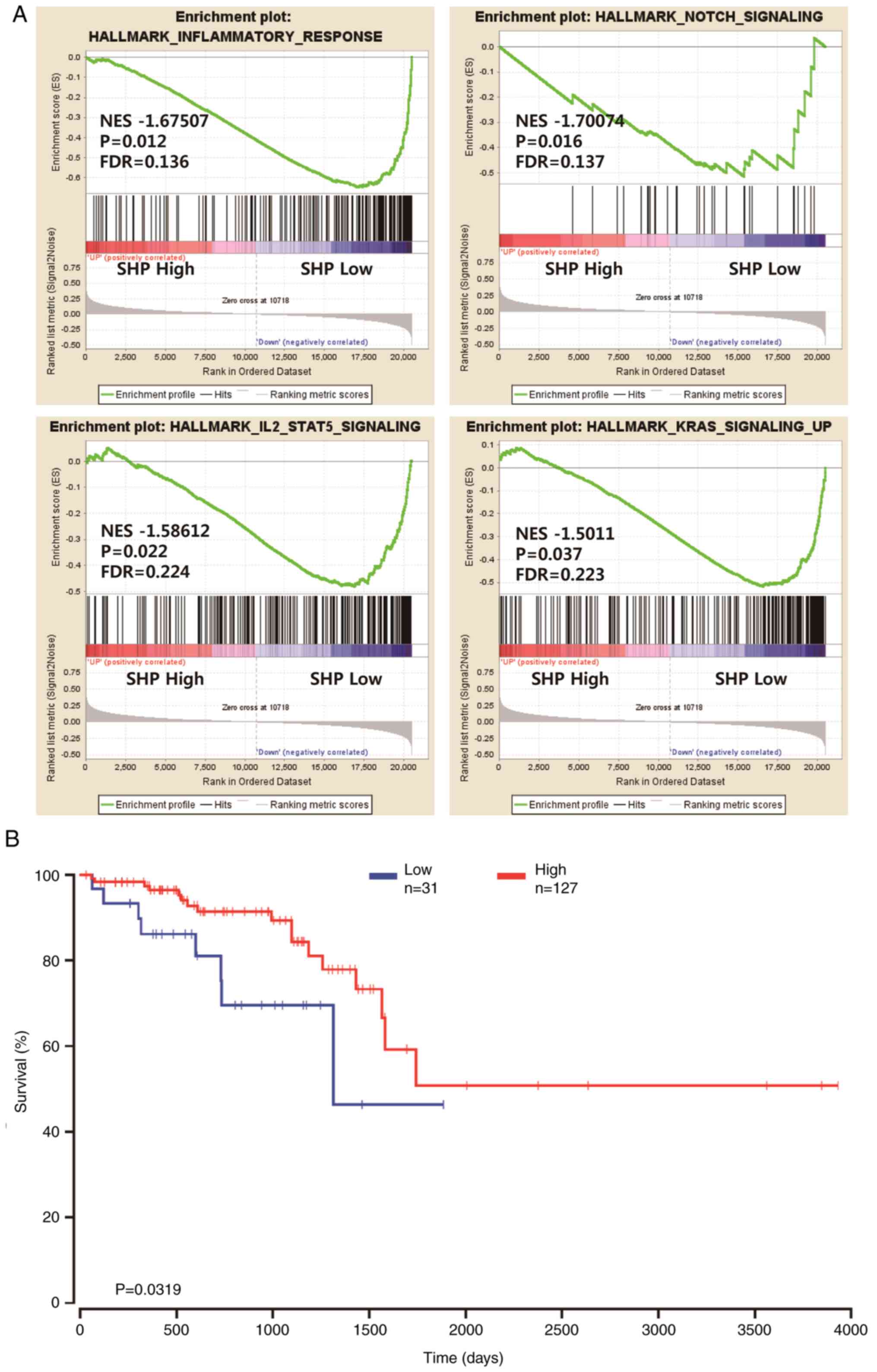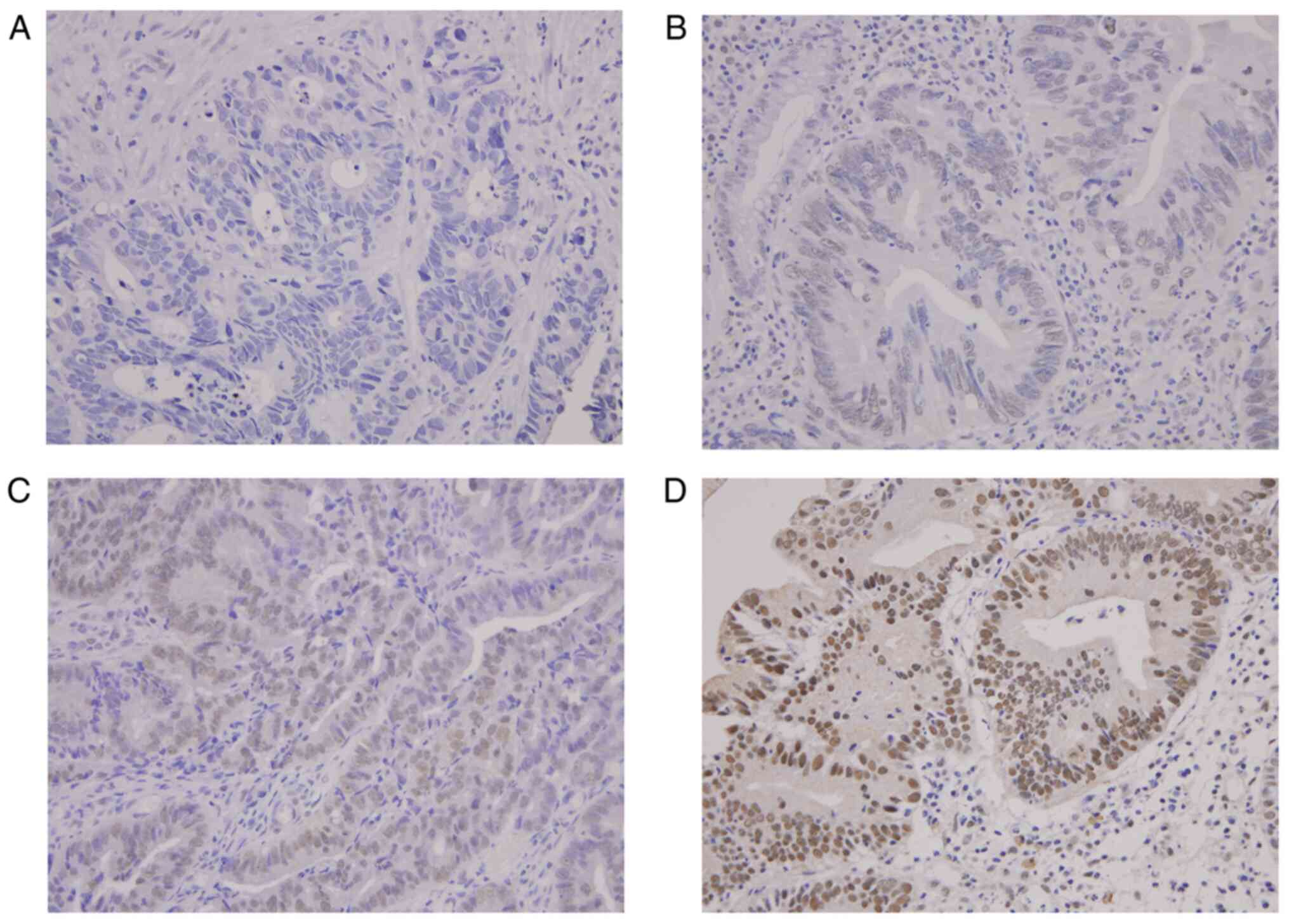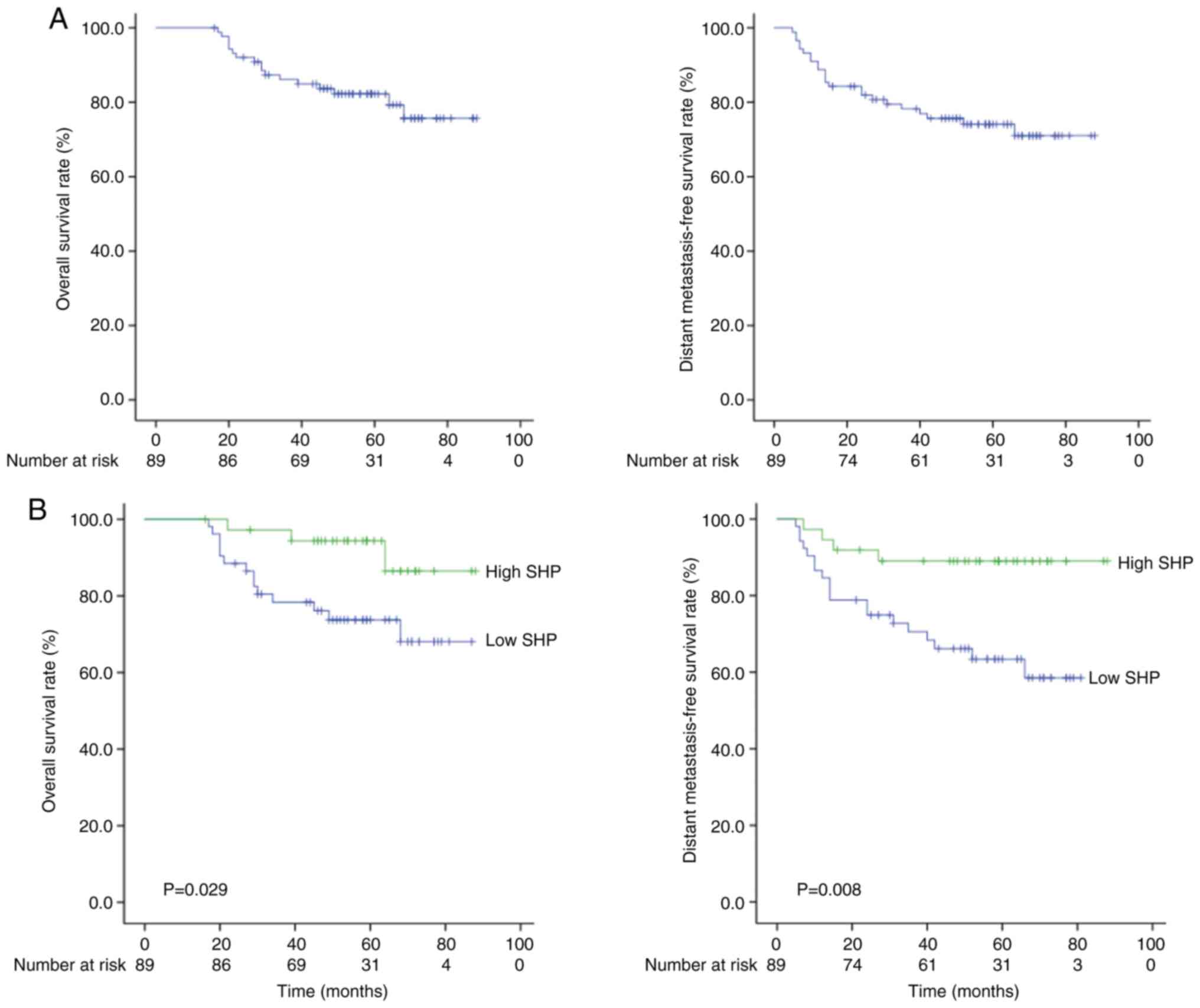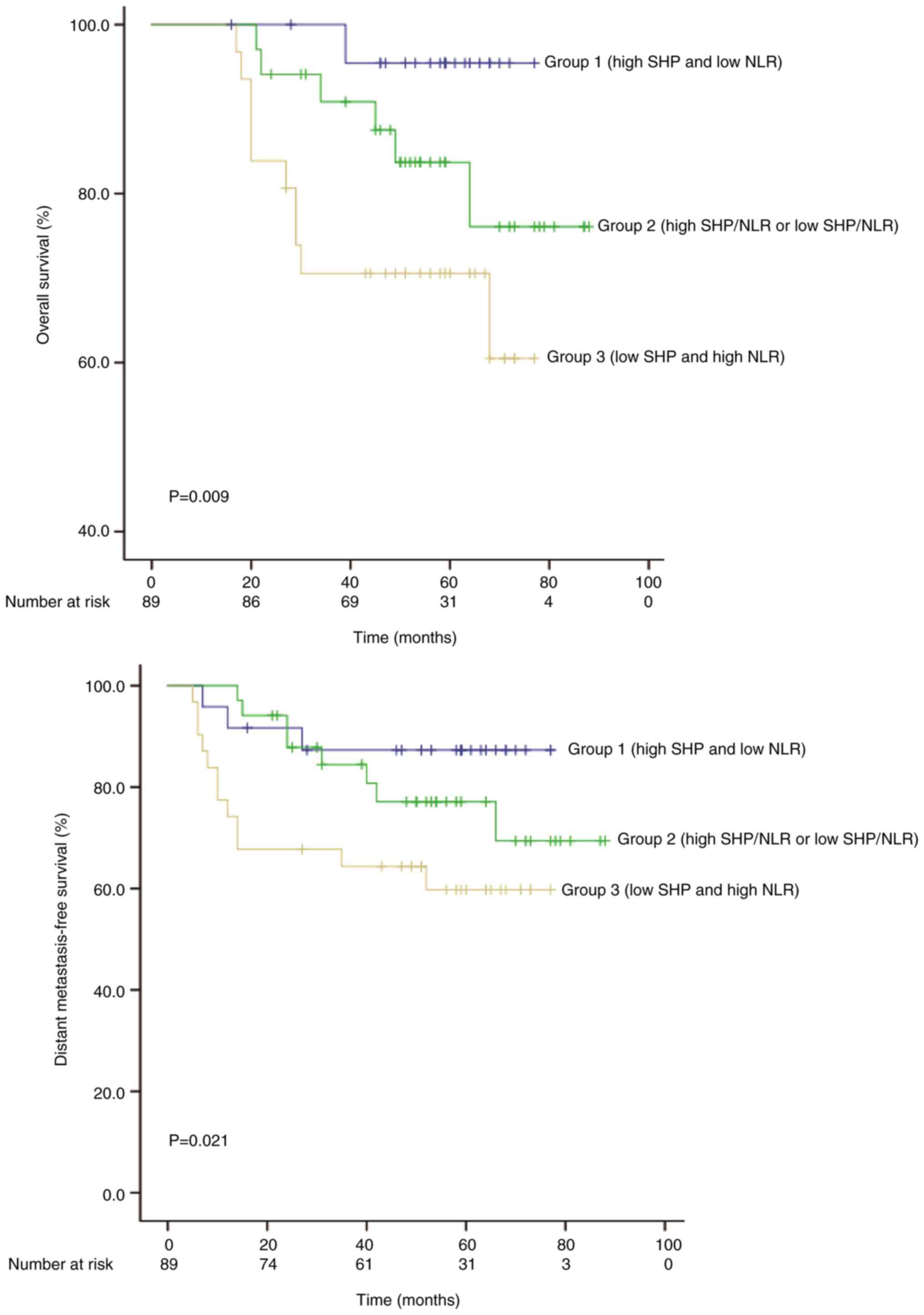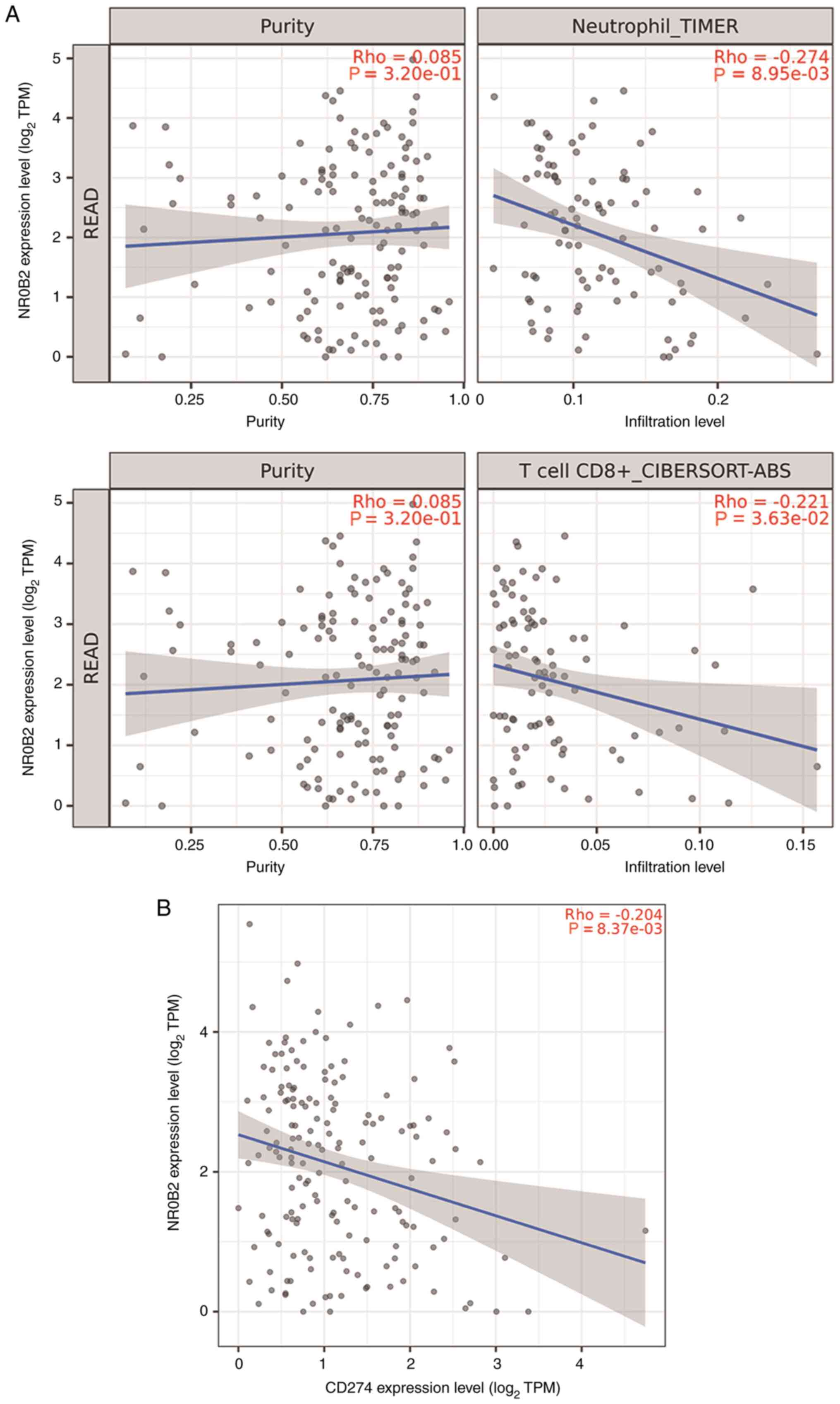|
1
|
Kuo LJ, Liu MC, Jian JJ, Horng CF, Cheng
TI, Chen CM, Fang WT and Chung YL: Is final TNM staging a predictor
for survival in locally advanced rectal cancer after preoperative
chemoradiation therapy? Ann Surg Oncol. 14:2766–2772. 2007.
View Article : Google Scholar : PubMed/NCBI
|
|
2
|
Seol W, Choi HS and Moore DD: An orphan
nuclear hormone receptor that lacks a DNA binding domain and
heterodimerizes with other receptors. Science. 272:1336–1339. 1996.
View Article : Google Scholar : PubMed/NCBI
|
|
3
|
Seol W, Chung M and Moore DD: Novel
receptor interaction and repression domains in the orphan receptor
SHP. Mol Cell Biol. 17:7126–7131. 1997. View Article : Google Scholar : PubMed/NCBI
|
|
4
|
Burris TP, Solt LA, Wang Y, Crumbley C,
Banerjee S, Griffett K, Lundasen T, Hughes T and Kojetin DJ:
Nuclear receptors and their selective pharmacologic modulators.
Pharmacol Rev. 65:710–778. 2013. View Article : Google Scholar : PubMed/NCBI
|
|
5
|
Kim MK, Chanda D, Lee IK, Choi HS and Park
KG: Targeting orphan nuclear receptor SHP in the treatment of
metabolic diseases. Expert Opin Ther Targets. 14:453–466. 2010.
View Article : Google Scholar : PubMed/NCBI
|
|
6
|
Zhang Y, Hagedorn CH and Wang L: Role of
nuclear receptor SHP in metabolism and cancer. Biochim Biophys
Acta. 1812:893–908. 2011. View Article : Google Scholar : PubMed/NCBI
|
|
7
|
Zhang Y, Soto J, Park K, Viswanath G,
Kuwada S, Abel ED and Wang L: Nuclear receptor SHP, a death
receptor that targets mitochondria, induces apoptosis and inhibits
tumor growth. Mol Cell Biol. 30:1341–1356. 2010. View Article : Google Scholar : PubMed/NCBI
|
|
8
|
Zhang Y, Xu P, Park K, Choi Y, Moore DD
and Wang L: Orphan receptor small heterodimer partner suppresses
tumorigenesis by modulating cyclin D1 expression and cellular
proliferation. Hepatology. 48:289–298. 2008. View Article : Google Scholar : PubMed/NCBI
|
|
9
|
He N, Park K, Zhang Y, Huang J, Lu S and
Wang L: Epigenetic inhibition of nuclear receptor small heterodimer
partner is associated with and regulates hepatocellular carcinoma
growth. Gastroenterology. 134:793–802. 2008. View Article : Google Scholar : PubMed/NCBI
|
|
10
|
Song G, Zhang Y and Wang L: MicroRNA-206
targets notch3, activates apoptosis, and inhibits tumor cell
migration and focus formation. J Biol Chem. 284:31921–31927. 2009.
View Article : Google Scholar : PubMed/NCBI
|
|
11
|
Seol W, Hanstein B, Brown M and Moore DD:
Inhibition of estrogen receptor action by the orphan receptor SHP
(short heterodimer partner). Mol Endocrinol. 12:1551–1557. 1998.
View Article : Google Scholar : PubMed/NCBI
|
|
12
|
Johansson L, Thomsen JS, Damdimopoulos AE,
Spyrou G, Gustafsson JA and Treuter E: The orphan nuclear receptor
SHP inhibits agonist-dependent transcriptional activity of estrogen
receptors ERalpha and ERbeta. J Biol Chem. 274:345–353. 1999.
View Article : Google Scholar : PubMed/NCBI
|
|
13
|
Lai K, Harnish DC and Evans MJ: Estrogen
receptor alpha regulates expression of the orphan receptor small
heterodimer partner. J Biol Chem. 278:36418–36429. 2003. View Article : Google Scholar : PubMed/NCBI
|
|
14
|
Nishizawa H, Yamagata K, Shimomura I,
Takahashi M, Kuriyama H, Kishida K, Hotta K, Nagaretani H, Maeda N,
Matsuda M, et al: Small heterodimer partner, an orphan nuclear
receptor, augments peroxisome proliferator-activated receptor gamma
transactivation. J Biol Chem. 277:1586–1592. 2002. View Article : Google Scholar : PubMed/NCBI
|
|
15
|
Rubin GL, Duong JH, Clyne CD, Speed CJ,
Murata Y, Gong C and Simpson ER: Ligands for the peroxisomal
proliferator-activated receptor gamma and the retinoid X receptor
inhibit aromatase cytochrome P450 (CYP19) expression mediated by
promoter II in human breast adipose. Endocrinology. 143:2863–2871.
2002. View Article : Google Scholar : PubMed/NCBI
|
|
16
|
Swales KE, Korbonits M, Carpenter R, Walsh
DT, Warner TD and Bishop-Bailey D: The farnesoid X receptor is
expressed in breast cancer and regulates apoptosis and aromatase
expression. Cancer Res. 66:10120–10126. 2006. View Article : Google Scholar : PubMed/NCBI
|
|
17
|
Coussens LM and Werb Z: Inflammation and
cancer. Nature. 420:860–867. 2002. View Article : Google Scholar : PubMed/NCBI
|
|
18
|
Woo HD, Kim K and Kim J: Association
between preoperative C-reactive protein level and colorectal cancer
survival: A meta-analysis. Cancer Causes Control. 26:1661–1670.
2015. View Article : Google Scholar : PubMed/NCBI
|
|
19
|
Choi N, Kim JH, Chie EK, Gim J and Kang
HC: A meta-analysis of the impact of neutrophil-to-lymphocyte ratio
on treatment outcomes after radiotherapy for solid tumors. Medicine
(Baltimore). 98:e153692019. View Article : Google Scholar : PubMed/NCBI
|
|
20
|
Song W, Wang K, Zhang RJ and Zou SB:
Prognostic value of the lymphocyte monocyte ratio in patients with
colorectal cancer: A meta-analysis. Medicine (Baltimore).
95:e55402016. View Article : Google Scholar : PubMed/NCBI
|
|
21
|
Tan D, Fu Y, Su Q and Wang H: Prognostic
role of platelet-lymphocyte ratio in colorectal cancer: A
systematic review and meta-analysis. Medicine (Baltimore).
95:e38372016. View Article : Google Scholar : PubMed/NCBI
|
|
22
|
Park JH, Richards CH, McMillan DC, Horgan
PG and Roxburgh CSD: The relationship between tumour stroma
percentage, the tumour microenvironment and survival in patients
with primary operable colorectal cancer. Ann Oncol. 25:644–651.
2014. View Article : Google Scholar : PubMed/NCBI
|
|
23
|
Diakos CI, Charles KA, McMillan DC and
Clarke SJ: Cancer-related inflammation and treatment effectiveness.
Lancet Oncol. 15:e493–e503. 2014. View Article : Google Scholar : PubMed/NCBI
|
|
24
|
Yuk JM, Jin HS and Jo EK: Small
heterodimer partner and innate immune regulation. Endocrinol Metab
(Seoul). 31:17–24. 2016. View Article : Google Scholar : PubMed/NCBI
|
|
25
|
Yuk JM, Shin DM, Lee HM, Kim JJ, Kim SW,
Jin HS, Yang CS, Park KA, Chanda D, Kim DK, et al: The orphan
nuclear receptor SHP acts as a negative regulator in inflammatory
signaling triggered by Toll-like receptors. Nat Immunol.
12:742–751. 2011. View
Article : Google Scholar : PubMed/NCBI
|
|
26
|
Yang CS, Yuk JM, Kim JJ, Hwang JH, Lee CH,
Kim JM, Oh GT, Choi HS and Jo EK: Small heterodimer
partner-targeting therapy inhibits systemic inflammatory responses
through mitochondrial uncoupling protein 2. PLoS One. 8:e634352013.
View Article : Google Scholar : PubMed/NCBI
|
|
27
|
Yang CS, Kim JJ, Kim TS, Lee PY, Kim SY,
Lee HM, Shin DM, Nguyen LT, Lee MS, Jin HS, et al: Small
heterodimer partner interacts with NLRP3 and negatively regulates
activation of the NLRP3 inflammasome. Nat Commun. 6:61152015.
View Article : Google Scholar : PubMed/NCBI
|
|
28
|
Eun HS, Cho SY, Lee BS, Kim S, Song IS,
Chun K, Oh CH, Yeo MK, Kim SH and Kim KH: Cytochrome P450 4A11
expression in tumor cells: A favorable prognostic factor for
hepatocellular carcinoma patients. J Gastroenterol Hepatol.
34:224–233. 2019. View Article : Google Scholar : PubMed/NCBI
|
|
29
|
Snipstad K, Fenton CG, Kjaeve J, Cui G,
Anderssen E and Paulssen RH: New specific molecular targets for
radio-chemotherapy of rectal cancer. Mol Oncol. 4:52–64. 2010.
View Article : Google Scholar : PubMed/NCBI
|
|
30
|
Li T, Fan J, Wang B, Traugh N, Chen Q, Liu
JS, Li B and Liu XS: TIMER: A web server for comprehensive analysis
of tumor-infiltrating immune cells. Cancer Res. 77:e108–e110. 2017.
View Article : Google Scholar : PubMed/NCBI
|
|
31
|
Weiser MR: AJCC 8th edition: Colorectal
cancer. Ann Surg Oncol. 25:1454–1455. 2018. View Article : Google Scholar : PubMed/NCBI
|
|
32
|
Livak KJ and Schmittgen TD: Analysis of
relative gene expression data using real-time quantitative PCR and
the 2(-Delta Delta C(T)) method. Methods. 25:402–408. 2001.
View Article : Google Scholar : PubMed/NCBI
|
|
33
|
Jochems C and Schlom J: Tumor-infiltrating
immune cells and prognosis: The potential link between conventional
cancer therapy and immunity. Exp Biol Med (Maywood). 236:567–579.
2011. View Article : Google Scholar : PubMed/NCBI
|
|
34
|
Thompson ED, Zahurak M, Murphy A, Cornish
T, Cuka N, Abdelfatah E, Yang S, Duncan M, Ahuja N, Taube JM, et
al: Patterns of PD-L1 expression and CD8 T cell infiltration in
gastric adenocarcinomas and associated immune stroma. Gut.
66:794–801. 2017. View Article : Google Scholar : PubMed/NCBI
|
|
35
|
Roxburgh CS and McMillan DC: Cancer and
systemic inflammation: Treat the tumour and treat the host. Br J
Cancer. 110:1409–1412. 2014. View Article : Google Scholar : PubMed/NCBI
|
|
36
|
Tyagi A, Sharma AK and Damodaran C: A
review on notch signaling and colorectal cancer. Cells. 9:15492020.
View Article : Google Scholar : PubMed/NCBI
|
|
37
|
Chen S-Y, Chen S, Feng W, Li Z, Luo Y and
Zhu X: A STING-related prognostic score predicts high-risk patients
of colorectal cancer and provides insights into immunotherapy. Ann
Transl Med. 9:142021. View Article : Google Scholar : PubMed/NCBI
|
|
38
|
Arrington AK, Heinrich EL, Lee W, Duldulao
M, Patel S, Sanchez J, Garcia-Aguilar J and Kim J: Prognostic and
predictive roles of KRAS mutation in colorectal cancer. Int J Mol
Sci. 13:12153–12168. 2012. View Article : Google Scholar : PubMed/NCBI
|
|
39
|
Grivennikov SI, Greten FR and Karin M:
Immunity, inflammation, and cancer. Cell. 140:883–899. 2010.
View Article : Google Scholar : PubMed/NCBI
|
|
40
|
Hannisdal E, Tveit KM, Theodorsen L and
Høst H: Host markers and prognosis in recurrent rectal carcinomas
treated with radiotherapy. Acta Oncol. 33:415–421. 1994. View Article : Google Scholar : PubMed/NCBI
|
|
41
|
Xiao B, Peng J, Zhang R, Xu J, Wang Y,
Fang Y, Lin J, Pan Z and Wu X: Density of CD8+ lymphocytes in
biopsy samples combined with the circulating lymphocyte ratio
predicts pathologic complete response to chemoradiotherapy for
rectal cancer. Cancer Manag Res. 9:701–708. 2017. View Article : Google Scholar : PubMed/NCBI
|
|
42
|
Hodek M, Sirák I, Ferko A, Örhalmi J,
Hovorková E, Hadži Nikolov D, Paluska P, Kopecký J, Petera J and
Vošmik M: Neoadjuvant chemoradiotherapy of rectal carcinoma:
Baseline hematologic parameters influencing outcomes. Strahlenther
Onkol. 192:632–640. 2016. View Article : Google Scholar : PubMed/NCBI
|
|
43
|
Kim IY, You SH and Kim YW:
Neutrophil-lymphocyte ratio predicts pathologic tumor response and
survival after preoperative chemoradiation for rectal cancer. BMC
Surg. 14:942014. View Article : Google Scholar : PubMed/NCBI
|
|
44
|
Lee JH, Song C, Kang SB, Lee HS, Lee KW
and Kim JS: Predicting pathological complete regression with
haematological markers during neoadjuvant chemoradiotherapy for
locally advanced rectal cancer. Anticancer Res. 38:6905–6910. 2018.
View Article : Google Scholar : PubMed/NCBI
|
|
45
|
Multhoff G and Radons J: Radiation,
inflammation, and immune responses in cancer. Front Oncol.
2:582012. View Article : Google Scholar : PubMed/NCBI
|
|
46
|
Gonda K, Shibata M, Sato Y, Washio M,
Takeshita H, Shigeta H, Ogura M, Oka S and Sakuramoto S: Elevated
neutrophil-to-lymphocyte ratio is associated with nutritional
impairment, immune suppression, resistance to S-1 plus cisplatin,
and poor prognosis in patients with stage IV gastric cancer. Mol
Clin Oncol. 7:1073–1078. 2017.PubMed/NCBI
|
|
47
|
Topalian SL, Drake CG and Pardoll DM:
Immune checkpoint blockade: A common denominator approach to cancer
therapy. Cancer Cell. 27:450–461. 2015. View Article : Google Scholar : PubMed/NCBI
|
|
48
|
McGranahan N, Furness AJ, Rosenthal R,
Ramskov S, Lyngaa R, Saini SK, Jamal-Hanjani M, Wilson GA, Birkbak
NJ, Hiley CT, et al: Clonal neoantigens elicit T cell
immunoreactivity and sensitivity to immune checkpoint blockade.
Science. 351:1463–1469. 2016. View Article : Google Scholar : PubMed/NCBI
|















